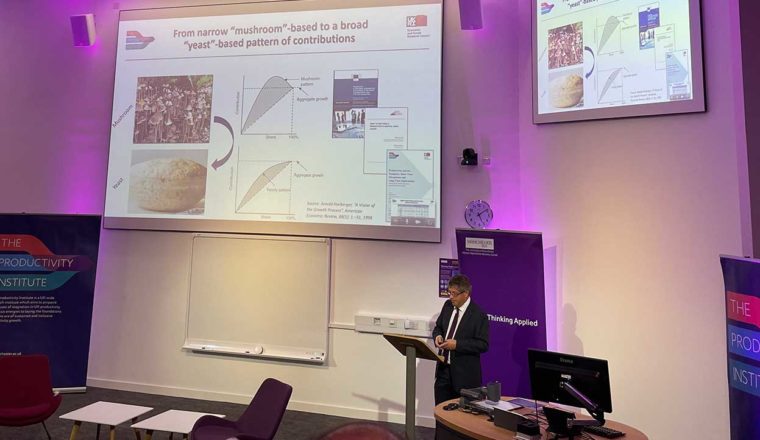Lessons for Wales: 3 Smart Takeaways from Productivity Pitches #7: Welfare
By Dr Fari Aftab, Wales Forum Research Associate
There is a growing need to embrace innovation and move beyond traditional solutions as Wales continues to face persistent productivity challenges across various sectors compared to the rest of the UK (Melanie Jones, 2025). As a new research associate for the Wales Productivity Forum, I recently had the opportunity to attend Productivity Pitches #7 Welfare, an event organised by the Institute for Government in collaboration with The Productivity Institute, where representatives from areas such as Islington, West London and Belfast shared how they have tackled various productivity challenges they identified through innovative, people-first approaches.
In this post, I share the key takeaways that resonated most and how Wales could build on them.
1. Be proactive, not reactive: Reach the people who need you most
The council in Islington took a data driven approach to identify older residents who had unclaimed pension-credit. Instead of waiting for applications to arrive, they reached out directly, offered help to apply and then followed through each individual case until it was resolved. This meant that many people who were likely struggling financially were able to access funds they didn’t know they were entitled to, thus reducing stress and improving overall well-being. In addition, their innovative approach allowed them to lower care costs for the council.
What Wales could learn:
We already have the data related to incomes, health and housing, which implies there is a potential to identify people who may need support but are not in the position to apply for it. With the right approach, we could connect them to help with benefits, energy costs and social care. Instead of expecting people to navigate a maze of services, bring support to their doorstep, which makes the provision of services fairer and more efficient.
2. Services designed around people
The Shaw trust in West London and the local councils collaborated on a “Single Front Door” to allow people who are in search of work to gain easier access to support. They gathered the necessary funding and designed an innovative, simple route, offering tailored help depending on job seeker’s needs, from mental health support to relevant job training required.
What Wales could learn:
Often, people fall through the cracks between services, whether it is employment support, health assistance, or housing concerns. What if there were localised, “One-stop hubs” that combined support from councils, NHS, job centres and community groups? This has the potential to eliminate duplication of work, save time and lead to better outcomes and productivity gains.
3. Match skills to market needs
Belfast City Council found an innovative way to deal with the persistent vacancies in the city. Instead of training people with transferrable skills for a vast array of jobs, they started with what employers actually need. They constructed training courses tailored to the vacancies in the area, which guaranteed interviews at the end. The success of the initiative was evident as 75% of participants in the programme went on to secure employment.
What Wales could learn:
Welsh employers face shortages in skills such as care, green energy and digital (Welsh Government, 2023; Neil Reynolds, 2024; Niki Favorido, 2024; Donna Miller, 2024), but training schemes often require a long-term commitment and time allocation. What if we worked hand-in-hand with employers to design focused training courses targeting specific job requirements that lead straight to interviews for the successful candidates? This could be realised through collaboration with regional skills partnerships and colleges, starting with small-scale initiatives before expanding more broadly.
My final thoughts about the Productivity Pitches #7 Welfare event is that, when it comes to welfare, productivity is not a race, it is a strategy that places people at its centre. All three innovations took a people-first approach, supported by practical design, good management and local leadership as oversight. For Wales, this means designing services with users in mind, leveraging shared data and fostering collaboration across systems working in harmony as they aim to achieve a common goal. A recording of the full event is available on the Institute for Government’s website.
References
- Donna Miller (2024) Skills Wales. Health and Social Care Sector in Wales is Facing a Workforce Crisis.
- Melanie Jones (2025) Wales’ Productivity Challenge: A Focus on the Future, Productivity Insights Paper No. 051, The Productivity Institute.
- Neil Reynolds (2024) Engineering Construction Industry Training Board, Moving the Dial: Bridging the Green Skills Energy Gap in Wales. Skills Wales.
- Niki Favorido (2024) Open University & British Chambers of Commerce, Almost half of Welsh businesses report skills shortage and lack confidence in AI and green tech.
- Welsh Government (2023) Net Zero Wales Skills Action Plan 2023–2025.



